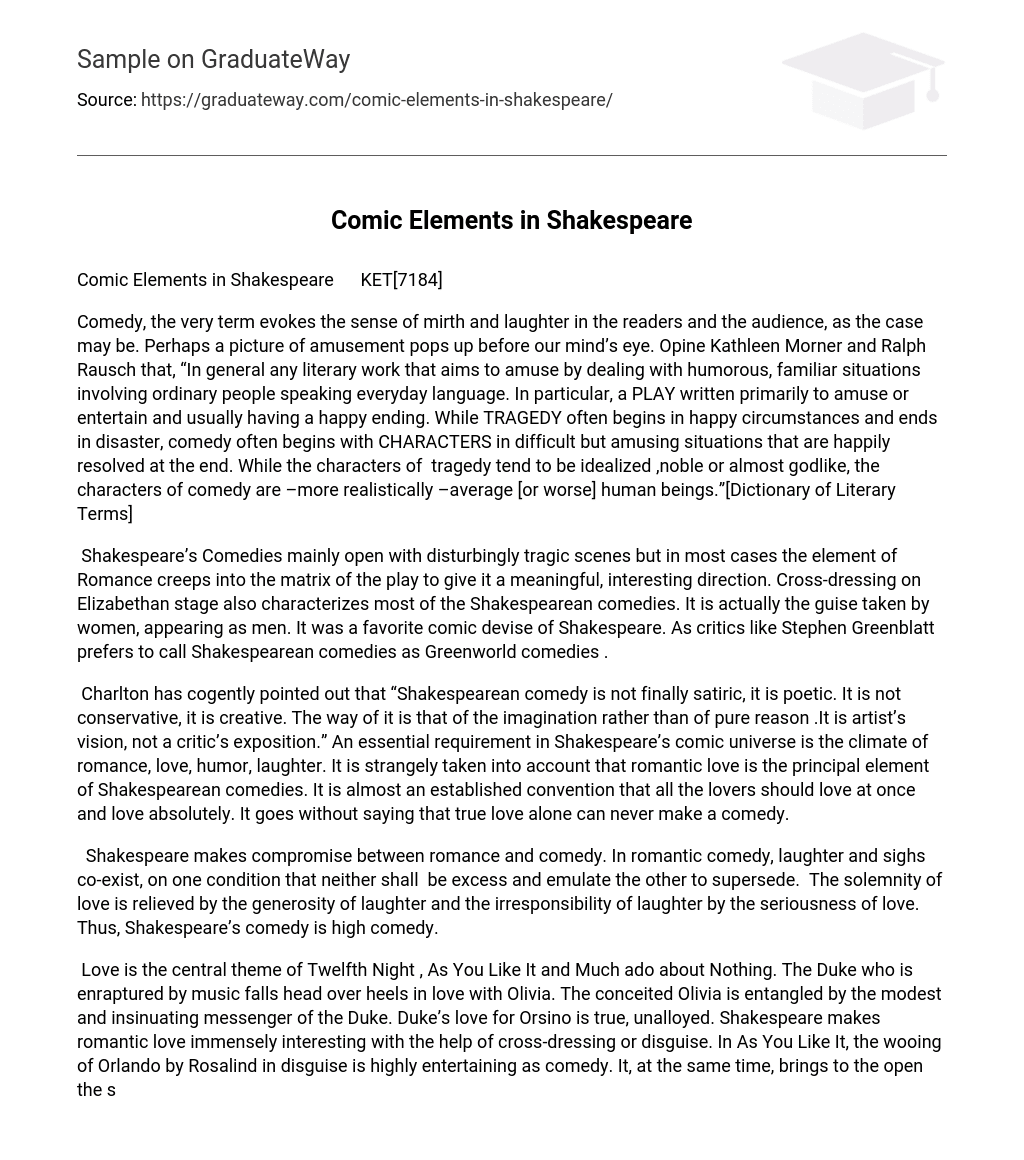Comic Elements in Shakespeare – KET[7184]
Comedy evokes a sense of mirth and laughter in readers and audiences alike. It brings to mind amusing situations involving ordinary people speaking everyday language. Kathleen Morner and Ralph Rausch define comedy as any literary work that aims to amuse, particularly a play with a happy ending. Unlike tragedy, which often begins in happy circumstances but ends in disaster, comedy begins with characters facing difficult yet amusing situations that are happily resolved by the end. While tragic characters tend to be idealized or noble, those in comedies are more realistically portrayed as average or even worse human beings.
Shakespeare’s Comedies typically begin with disturbingly tragic scenes, but in most cases, the element of romance creeps into the matrix of the play to give it a meaningful and interesting direction. Cross-dressing on the Elizabethan stage also characterizes many of Shakespeare’s comedies. This is when women appear as men, and it was a favorite comic device of Shakespeare. Some critics, like Stephen Greenblatt, prefer to call these plays Greenworld comedies.
Charlton has cogently pointed out that “Shakespearean comedy is not finally satiric, it is poetic. It is not conservative, it is creative. The way of it is that of the imagination rather than pure reason. It is the artist’s vision, not a critic’s exposition.”
An essential requirement in Shakespeare’s comic universe is a climate of romance, love, humor and laughter. It’s almost an established convention that all lovers should love at once and absolutely – romantic love being the principal element of Shakespearean comedies.
However, true love alone can never make a comedy.
Shakespeare strikes a compromise between romance and comedy in his works. In romantic comedies, laughter and sighs coexist, but only if neither overshadows the other. The seriousness of love is lightened by the generosity of laughter, while the frivolity of laughter is balanced by the gravity of love. This balance creates what is known as high comedy in Shakespeare’s plays.
Love is the central theme of three of Shakespeare’s plays: Twelfth Night, As You Like It, and Much Ado About Nothing. In Twelfth Night, the Duke becomes enamored with Olivia through her love of music. Meanwhile, Olivia is charmed by the Duke’s modest messenger. The Duke’s love for Orsino is pure and unwavering. Shakespeare uses cross-dressing and disguise to add interest to romantic love in these plays. In As You Like It, Rosalind disguises herself to woo Orlando in a comedic yet serious portrayal of her true feelings.
Shakespeare even regales the audience with a dramatized story of courtship. Instructing Orlando to woo her in masquerade, Rosalind charts a new direction of love-making that provides a great experience for the lovers. The comicality of the situation immediately gives the audience a taste of comedy. Deception by Malvolio, salt humor from Touchstone and Dogberry, and sentimental excesses from Sylvius and Phoebe supply realistic and satiric elements to this comedy. In Much Ado about Nothing, great delight comes from the contrast in Beatrice’s and Benedick’s consideration of their situation as tragic while it has actually been begotten by Don Pedro, Claudio, and Leonato’s plotting. Those who fail to enjoy this contrast that induces thought-provoking laughter are unfortunate.
Dr. Samuel Johnson claimed in his Preface to Shakespeare that, …in his comic scenes, he seems to produce without labor what no labor can improve… His tragedy seems to be skill, his comedy instinct.” Johnson may have intended to say that Shakespeare was either a natural comedy writer or that his vision of life was inherently comedic.
Henri Bergson made three observations on the comic spirit. Firstly, comedy is strictly human and does not exist outside of it. Secondly, laughter is devoid of feeling and appeals directly to the intelligence. Thirdly, laughter evokes a social response from others in a group and therefore has social significance.
George Meredith believed that comedy must “awaken thoughtful laughter.”
When these views are applied to Shakespearean Comedies, we find they evade the observations of Bergson and Meredith.
Shakespearean comedies are full of humor. The humorist often finds amusement in certain individual foibles, which they not only condemn but also laugh at. When dramatists like Shakespeare ridicule these foibles in their comedies, such works may be called Comedies of Criticism. Alternatively, the humorist may seek to escape the drudgery and sordidness of everyday life and take refuge in a world of fantasy instead. This type of comedy could easily be termed Comedies of Escape.
Thus, considering all the comic elements of Shakespearean plays, it may be observed that comedy is not a futile attempt to color life through drama in a shoddy or immature manner. Instead, it is an inseparable part of life, even on stage. In the best of Shakespearean comedies, we come across a tinkering with philosophical issues. All the world’s a stage…” are lines from As You Like It, which happens to be a high-order Shakespearean comedy.
Works Cited
1. Charlton, H.B.: Shakespeare’s Comedies. Macmillan, UK, 1973.
2. Wilson, J.D.: Shakespeare’s Happy Comedies. Routledge, UK, 1965.
3. Evans, B.: Shakespeare’s Comedies. Orient Longman, UK, 1960.
Palmer, J. and Bradbury, M. (1972). Shakespearean Comedy. Faber & Faber: UK.
5. Muir, Kenneth. Shakespeare: The Comedies. Routledge, UK, 1965.
6. Morner, Kathleen and Rausch, Ralph. A Dictionary of Literary Terms. NTC Publishers: Illinois, USA, 1998.





